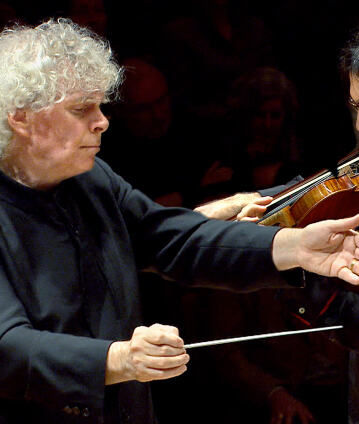Simon Rattle conducts Beethoven’s “Pastoral” Symphony and Modernist concertos

“Finest drawing, subtle humour, heartfelt singing, and when they needed to let rip, they really let it rip,” was how one critic praised Simon Rattle’s interpretation of Beethoven’s Pastoral. In addition, the concert includes Lutosławski’s Double Concerto and Dutilleux’s Violin Concerto with the mysterious title The Tree of Dreams with Leonidas Kavakos as the soloist – exceptional works of the 20th century full of brilliance and magic.
Beethoven described his Sixth Symphony as “more an expression of feeling than painting” even though the Pastoral Symphony dates from before the time of a dogged distinction between absolute and programme music. Even more astonishing than Beethoven’s labelling this a musical day in the country is its genesis: he composed the Pastoral contemporaneously with his Fifth Symphony and presented both for the first time on 22 December 1808 – what a programme! – along with the Fourth Piano Concerto, parts of the C major Mass, and the Choral Fantasy.
Has any composer more forcefully demonstrated the breadth of his musical invention? To Beethoven it came naturally: he often worked simultaneously on two works in the same genre in order to exhaust its expressive potential. And so the Pastoral forms a counterpart to the Fifth: in major instead of minor, in five rather than four movements, inspired by a programme as opposed to absolute music.
The last-mentioned contrast is also exhibited in the first part of this concert: the Double Concerto for Oboe, Harp and Chamber Orchestra by Witold Lutosławski strikes one as absolute music when heard alongside Henri Dutilleux’s Violin Concerto, the title of which – L’Arbre des songes – is ripe for programmatic interpretation. Marie-Pierre Langlamet (harp) and Jonathan Kelly (oboe), both members of the Berliner Philharmoniker, are the soloists in the Lutosławski Double Concerto; the solo part in L’Arbre des songes (The Tree of Dreams) is taken by Artist in Residence Leonidas Kavakos.
© 2013 Berlin Phil Media GmbH
Related interviews
Artists
Our recommendations
- Gustavo Dudamel conducts “Also sprach Zarathustra”
- Beethoven’s Violin Concerto with Leonidas Kavakos and Zubin Mehta
- Simon Rattle conducts Strauss and Beethoven
- Christian Thielemann conducts a concert “à la française”
- Brahms’s Requiem with Donald Runnicles and the Atlanta Symphony Chorus
- Simon Rattle conducts the 2015 Europakonzert in Athens